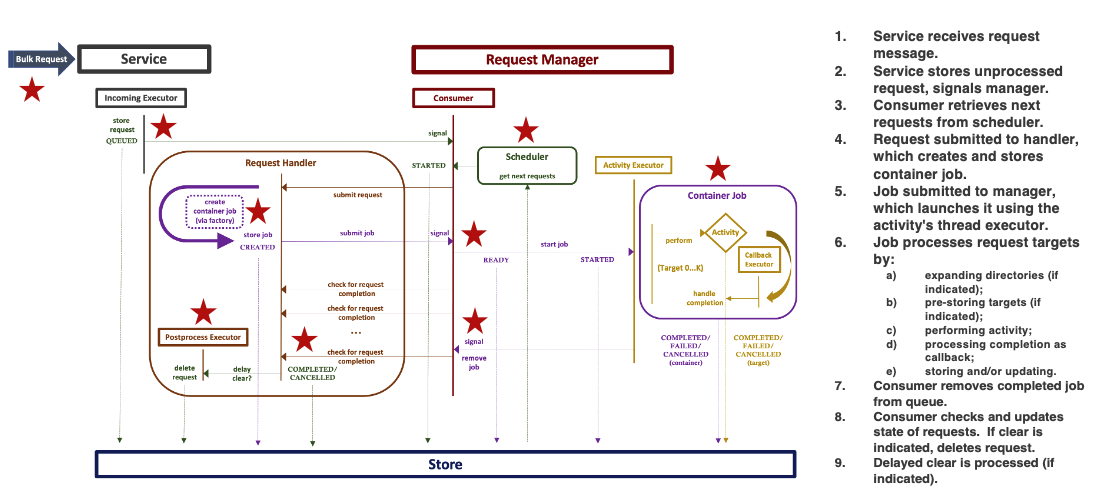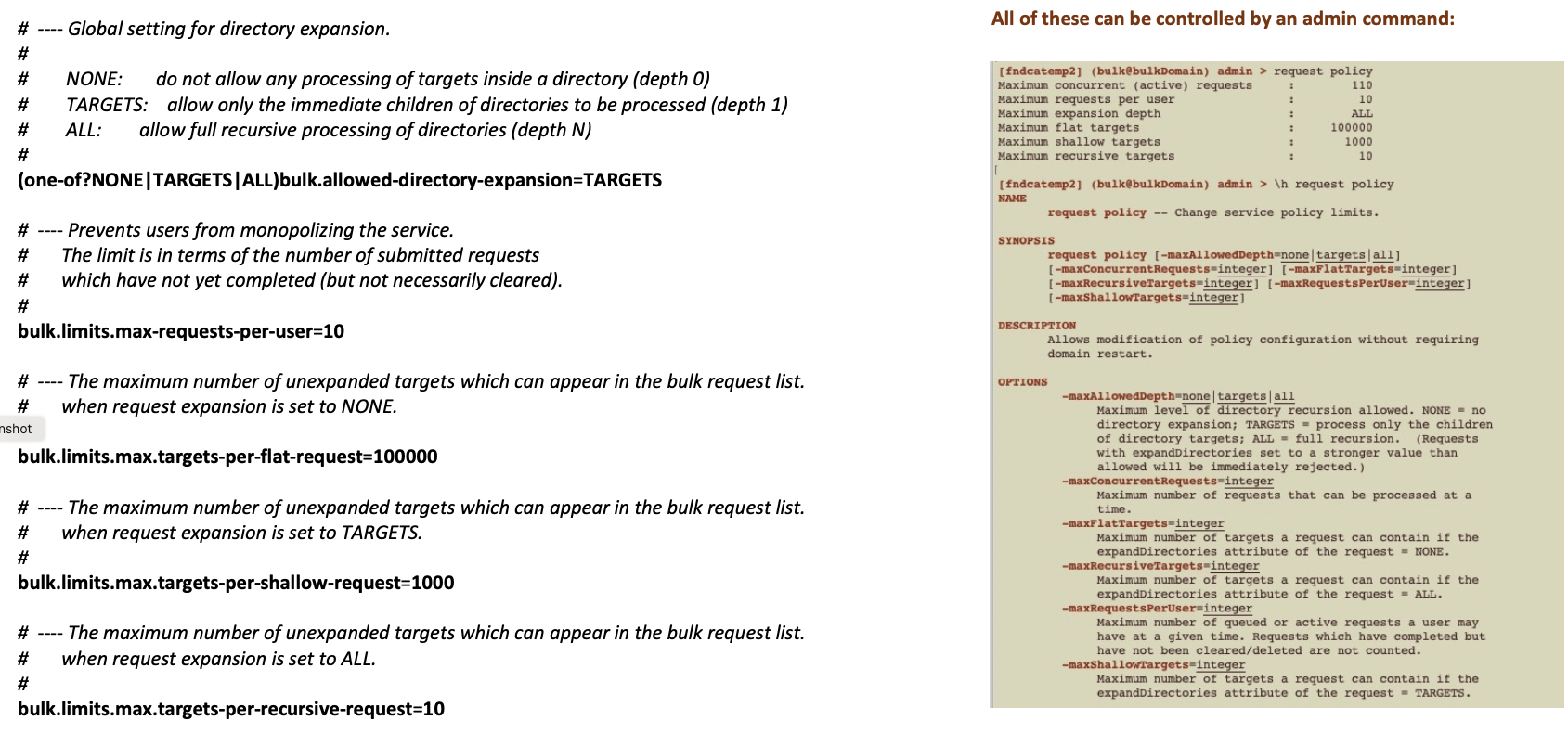CHAPTER 18. THE BULK SERVICE
The purpose of the bulk service is to manage mass file system operations involving lists of files and directories, the latter possibly treated recursively. In one sense it is meant to incorporate into dCache proper some of the functionality provided by SRM (such as prestaging of files).
Configuring
The service can run in a shared domain, but it is probably best to isolate it in its own.
[bulkDomain]
[bulkDomain/bulk]
The bulk service has not yet been rendered replicable, but this should not be difficult and may be in future versions.
The new version of bulk (version 2, as of dCache 8.2) requires a database consisting of three tables. As is customary, before the first startup of the service, be sure to create the database (e.g., using the postgres command-line tool):
createdb -U <user> bulk
The rest of the configuration takes place automatically on startup.
While things like thread queue sizes, cache expiration, consumer sweep interval and such can be adjusted as desired using the service properties, bulk is configured to run out of the box for most purposes. See the bulk.properties file for further information on settings.
A number of user-facing (policy) settings can also be controlled from the admin shell without requiring service restart (see below).
Requests
A bulk request consists of a list of targets (file paths) and an activity that should be applied to each, along with options for directory expansion or recursion, pre- and post-processing of the request.
The submission of a request by a user occurs via RESTful interfaces; currently, there is a general resource, bulk-requests, and two resources which specifically support the WLCG Tape API, stage and release. For the differences, along with a description of the options controlling the execution of the request, see the User Manual [Chapter 3. Frontend: Bulk Requests].
The bulk service receives these requests from the frontend service via dCache messaging. The order in which they are processed is determined by a scheduler. Currently, only one such scheduler has been implemented,
bulk.request-scheduler=org.dcache.services.bulk.manager.scheduler.LeastRecentFirstScheduler
which selects the least recent requests to run in order of arrival (first-come first-served).
Only a fixed number of requests can be running at a given time; the default corresponds to the number of threads made available for processing container jobs,
bulk.limits.container-processing-threads=110
but can be adjusted upwards or downwards via the admin shell command request policy, in which case the thread pool will be either over- or under-subscribed; this adjustment may be desirable under certain conditions (for example, increasing when there are many small high-latency jobs or decreasing when there are many large low-latency jobs). The number of requests which can be active or queued at a given time per user is also configurable.
Activities
An activity consists of some kind of action which can be taken on a file path. Depending on the activity, there may be a restriction as to whether it can take a directory target (these are hard-coded).
Activities are defined via an SPI (“Service Provider Interface”) as plugins to the service. The following are presently available:
- DELETE : file deletion, with or without removal of empty directories.
- PIN/UNPIN : by default, the pin uses the request id, but can optionally be given a different id. The default lifetime is five minutes (the same as for the NFS dot-command).
- STAGE/RELEASE : specialized WLCG versions of PIN/UNPIN.
- UPDATE_QOS : disk-to-tape and tape-to-disk transitions; communicates with the QoS Engine.
- LOG_TARGET : logs metadata for each target at the INFO level.
Each activity is associated with
- a permit count (used in connection with a semaphore for throttling execution);
- two thread queues, one for the execution of the container job, and the other for the execution of callbacks on activity futures;
- a retry policy (currently the only retry policy is a NOP, i.e., no retry).
The permits are configurable using either the property or the admin shell command request policy.
Should other retry policies become available, these can be set via a property.
The number and distribution of thread executors is hard-coded for the activities, but their respective sizes can be adjusted using the properties:
```
bulk.limits.container-processing-threads=110
bulk.limits.activity-callback-threads=50
```
Container Design
Version 2 of the bulk service has introduced improvements for better scalability and recovery.
All requests are now processed by a single container job which executes the targets serially while the callbacks on any target futures are executed asynchronously. A container can be configured to store initial target information in the database either when the target is acted upon (on the fly) or in advance (= prestore). The latter incurs some overhead, particularly for jobs in excess of 10K targets, but may be desirable for tasks like pinning where the time to completion is long, because it allows any queued targets to be seen ahead of time. All of the WLCG operations are hard-coded to prestore, but the general default is no prestorage.
In order to handle directories consistently, a container will queue them and delay their processing until all regular file targets have completed. Directories are always processed serially depth-first.
The following illustrates the structure of the service and its interactions when processing a request.

Cancellation is best effort, in the sense that the cessation of the bulk activity is not guaranteed to stop the activity in other dCache components. Flushing, for instance, cannot be easily cancelled.
NOTE: The user-driven attribute 'delay' for indicating how long to wait
before clearing a request on success or failure has been deprecated
and is no longer supported.
Storage and Recovery
Requests are stored when they are received. When the service fails or goes down, an attempt will be made to replay incomplete requests upon restart. This replay will leave untouched request targets that are already in some terminal state (COMPLETED, FAILED, CANCELLED) and will retry only those that had not reached completion or had not yet been acted upon. If the request was doing directory expansion, the directories are walked again and missing targets are added if any.
Admin Commands
The bulk service comes with a full set of admin shell commands which allow one to list the requests and targets, to launch and cancel requests and individual targets, to list the available activity types and inspect their arguments, and to monitor the state of the service itself. The request reset command removes all request targets from the database, returns the state to QUEUED and resubmits the request (i.e., this is a clean-slate retry of the request).
Particularly useful are the following policy properties which can be changed without requiring service restart using the admin shell command request policy:

